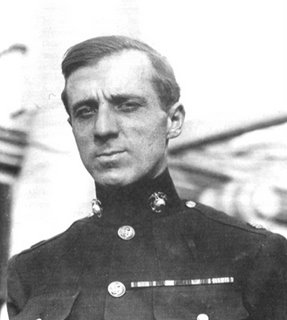Rosebud #199

There's an article on the cover of today's Sunday New York Times, "Across America, Deadly Echoes of Foreign Battles," about how veterans of the wars in Iraq and Afghanistan are coming home and committing murders. "In many cases," says the Times, "combat trauma and the stress of deployment appeared to play a role."
The war hero and anti-war activist Smedley Butler (see Rosebud #198) laid it all out more than 70 years ago in "War Is A Racket" (1935):
War is a Racket, Chapter Two:
Who Pays the Bills?
Who provides the profits—these nice little profits of 20, 100, 300, 1,500 and 1,800 per cent? We all pay them—in taxation...
But the soldier pays the biggest part of the bill.
If you don't believe this, visit the American cemeteries on the battlefields abroad. Or visit any of the veterans' hospitals in the United States...
Boys with a normal viewpoint were taken out of the fields and offices and factories and classrooms and put into tanks. There they were remolded; they were made over; they were made to "about face"; to regard murder as the order of the day. They were put shoulder to shoulder, and, through mass psychology, they were entirely changed. We used them for a couple of years and trained them to think nothing at all of killing or of being killed.
Then, suddenly, we discharged them and told them to make another "about face"! This time they had to do their own readjusting, sans mass psychology, sans officers' aid and advice, sans nation-wide propaganda. We didn't need them anymore. So we scattered them about without any "three-minute" or "Liberty Loan" speeches or parades.
Many, too many, of these fine young boys are eventually destroyed, mentally, because they could not make that final "about face" alone.
In the government hospital at Marion, Indiana, 1,800 of these boys are in pens! Five hundred of them in a barracks with steel bars and wires all around outside the buildings and on the porches. These already have been mentally destroyed. These boys don't even look like human beings. Oh, the looks on their faces! [Check out the pictures on the cover of the Times today.] Physically, they are in good shape; mentally, they are gone.
There are thousands and thousands of these cases, and more and more are coming in all the time. The tremendous excitement of the war, the sudden cutting off of that excitement—the young boys couldn't stand it.
That's a part of the bill. So much for the dead—they have paid their part of the war profits. So much for the mentally and physically woudned—they are paying now their share of the war profits. But the others paid, too—they paid with heartbreaks when they tore themselves away from their firesides and their families to don the uniform of Uncle Sam—on which a profit had been made. They paid another part in the training camps where they were regimented and drilled while others took their jobs and their places in the lives of their communities. They paid for it in the trenches where they shot and were shot; where they were hungry for days at a time; where they slept in the mud and in the cold and in the rain—with the moans and shrieks of the dying for a horrible lullaby...
Beautiful ideas were painted for our boys who were sent out to die. This was the "war to end wars." This was the "war to make the world safe for democracy." No one told them that dollars and cents were the real reason. No one mentioned to them, as they marched away, that their going and their dying would mean huge war profits. No one told these American soldiers that they might be shot down by bullets made by their own brothers here. No one told them that the ships on which they were going to cross might be torpedoed by submarines built with United States patents. They were just told it was to be a "glorious adventure."
Thus, having stuff patriotism down their throats, it was decided to make them help pay for the war, too. So, we have them the large salary of $30 a month!
All they had to do for this munificent sum was to leave their dear ones behind, give up their jobs, lie in swampy trenches, eat canned willy (when they could get it) and kill and kill and kill...and be killed.
<< Home